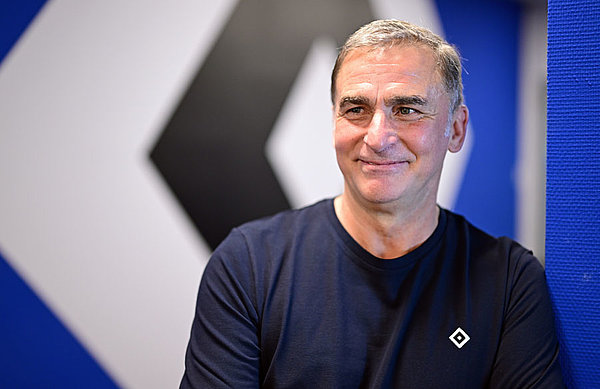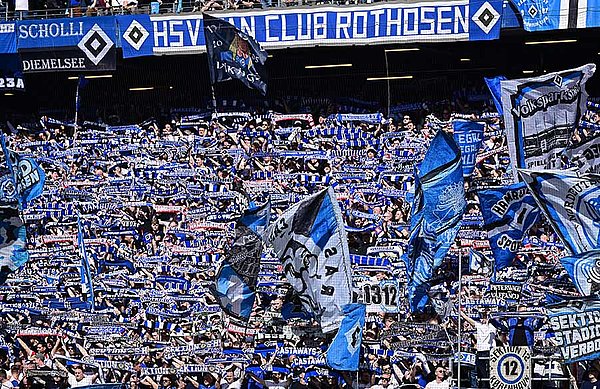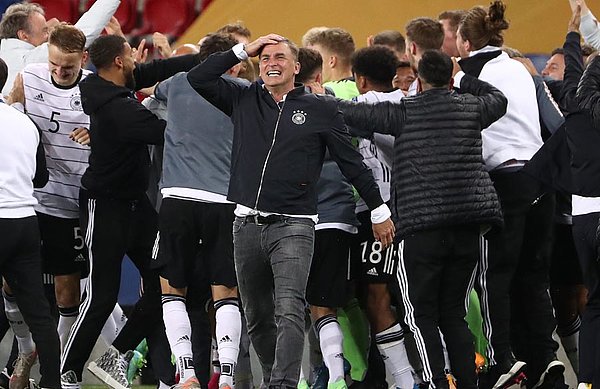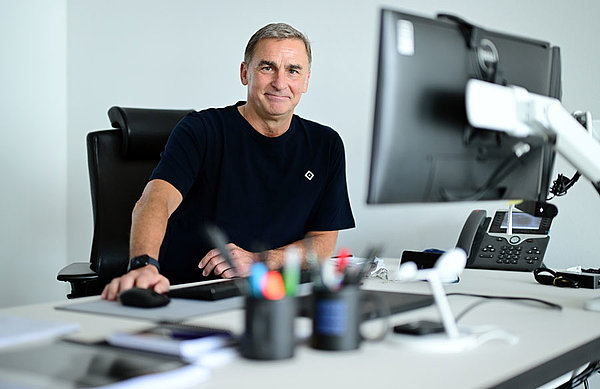
Interview
02.06.24
"A positive feeling"
In an interview with HSV.de, new board member for sport Stefan Kuntz spoke about his first days at HSV, immersing himself in the club’s culture, the relationship between the board and the head coach and bringing his experience in professional football to the table.
HSV.de: Stefan, a week has passed since you took up your new position as board member for sport at HSV. How were the first days for you?
Stefan Kuntz: When I first met all the club employees, everyone let me know that they were there to help, which really became evident during the first week. They weren’t just empty words, but instead, no matter where I went, everyone was ready and willing to help. That really left me with a good feeling at the start of my time here at HSV. I was immediately immersed into the culture of the club. That’s process isn’t complete yet, but it definitely impressed me right at the start of my tenure. For me, having a culture like that is a key part of HSV.
What exactly did your first days at the club look like?
There were a lot of topics to address, such as the first signatures in the process of extending Tom Mickel’s contract. Despite my many years of experience in football, it was still an emotional moment because it was my first contract at HSV. I also went on an extensive tour of the stadium, from the dressing rooms and the academy to the club offices. That was very important to me, in order to get to know all the employees in their various departments. My first days here included a bit of everything: from getting to know the club and my new colleagues, to spending a lot of time talking to Claus Costa and Steffen Baumgart and even starting to analyse some areas where I think we can improve.

What’s next on your agenda?
Now we’re working on putting together our squad. There are a few cases in which we have the decision-making power, and others where we’re dependent on things like release clauses. There are also plenty of discussions that need to be had with the supervisory board, my fellow board member Eric Huwer and other employees. Overall, I have a positive feeling – even before the start of my tenure, I was extremely motivated and this feeling has only grown since then. There’s a lot of ideas buzzing around in my head at the minute where I think I can really make an impact with my creativity and experience. That’s a good sign.
It’s a tough balancing act between settling in and getting to know everything, while also having the time crunch of needing to get things sorted ahead of the new season.
Exactly, that’s the balance that I’m trying to find at the minute. It’s obviously also dependent on our list of priorities. There are some set priorities that fall under my jurisdiction and where decisions need to be made quickly. In that sense, it’s a good thing that I’m in Hamburg without my family because it allows me to be available for 12 to 14 hours a day. If there’s a game, for example, the U19 cup final recently, then I have the ability to spontaneously go watch. In general, I’ve set myself the aim of absorbing as much as I can without forming an opinion, because I want to first experience everything and form a comprehensive impression.
Where does this approach come from?
Every club has a special feeling, a special atmosphere. I’m convinced that it’s only possible to form an opinion on some things after being fully immersed in the world of HSV. Things can look very different when looking at them from the outside in, as opposed to when you’re directly involved. I will definitely take the time to do just that. That’s why I’ve said that I definitely want to continue working with the team we have and want to help my colleagues continue their development.

You mentioned that every club is different and that you’ve already been able to immerse yourself in the culture at HSV. What impression do you have of HSV after your first days here?
In today’s world, where it’s not easy for young people to find their own identity, being a HSV fan is definitely something they can identify as. When you then discover a club culture that is based on loyalty, team spirit and diversity, then it can definitely have an impact on young people in particular. It’s great when young people are able to experience this team spirit. In today’s world, especially with the dangers of the Internet or bullying at school, it’s not so easy to experience what it means to be part of something bigger than yourself. Here, everyone that’s ready to support HSV is welcome. I find this to be extremely impressive.
Let’s turn our attention to on-the-pitch matters. What brand of football should HSV play and what mentality should they display when they take to the pitch for the start of the Bundesliga 2 season in early August?
We said that we want to give Steffen the chance to provide his input on the transfer window and be in charge for a full pre-season. Steffen also has a lot of confidence in our squad. He often says that his job as a coach is to help individual players improve – something we both agree on. For me, it’s important that we don’t describe it as being a ‘Baumgart’ or a ‘Kuntz’ squad, but rather a HSV squad that provides the coach with plenty of options throughout the Bundesliga 2 season.
What will this squad look like?
We will only really be able to provide a detailed answer at the end of the transfer window. At this moment, there are still too many potential scenarios at play, in which not everything is in our own hands. On the one hand, we need to act in those situations where we’re convinced that player will be able to help us out, in order to ensure that we enter into negotiations. On the other hand, we have to react when a player decides to activate their release clause or decides that they want to leave the club in the midst of their contract. The end of the transfer window is also when several deals end up being hammered out that might not appear very likely right now. We’re preparing for all these different scenarios.

As head coach of the Germany U21s, you spent many years working closely with young players. Is that something that you want to be involved with here at HSV as well?
It’s a topic that’s definitely also on my agenda. For me, developing young players means preparing them so that they are an option for the first-team squad. In the end, it’s a combination of things. We want to make sure that our academy players are slowly integrated into our first-team squad. At the same time, the second division doesn’t provide us with a lot time to spend waiting for a player to develop – which is what we’ve set out to do. There’s also always an opportunity to sign young and hungry players on loan. Even the big clubs are interested in sending a young player to a club with a rich history, one that has the duty to look to win every game.
The head coach plays a key role in the development of the players. You immediately announced your support for Steffen Baumgart upon taking up this position. What played a role in your decision?
One factor was that he identified small things that bothered him. I’m also convinced that addressing small issues like that will really help us to improve. Steffen has also made clear that he is willing and able to work with the players we have. That’s very similar to how I’ve also approached my new position. In the end, I also wanted to give him a fair chance. Loyalty is part of the culture at HSV and it wouldn’t have been right to deny him this chance.
You also enjoyed success as a head coach. In your opinion, what should the relationship between the board and the coach look like?
In my opinion, it’s good for the board to allow the coach to form their own ideas. I see myself as more of a sparring partner, by speaking up when I’m of the opinion that something does or doesn’t work. I see myself as a mirror that always checks in and asks questions, while also providing support. I don’t expect our team to play the same each time and for them to only play one brand of football. As a board member, you can help ensure that the squad fits to HSV, but everything else falls under the head coach’s responsibility. I’ve not for a second considered joining them on the sidelines on the bench.

Instead of being on the sidelines, your new position involves you spending the majority of your time in your office. What led to you wanting to take up a position like this again?
For me, it’s always been important to seek out challenges, because those are the only things that help you continue to grow as a person. As a result, I wasn’t able to state with 100% certainty recently that I’d remain in my role as a national team head coach. As soon as the first call came asking if I could imagine taking up a role as board member for sport again, my thought was that it was something I was capable of, but that it would depend on the club. That’s why I think that maintaining a certain level of emotional distance can only help when making decisions. To have someone be there that hasn’t been part of the HSV world for ages. For me, it also came down to the fact that I would only be able to accept a job if it really appealed to me. That was the case here. I told my wife that I really wanted to help out again. After my first meeting with the HSV supervisory board, she said to me “It really suits you, or?”
Does the change in position also have an impact on your own understanding of what it means to lead? It certainly must be a very different experience to lead a team compared to an entire club?
As a head coach, the fact that I’d previously been in charge of an office full of employees was of extreme benefit. My experience at VfL Bochum and 1. FC Kaiserslautern showed me how to be an effective leader. I was able to also benefit from this while with the Germany U21s, to great success, especially when working closely with young people. The pressure of taking part in a tournament with Germany or, even more so, the challenge of taking up the role with Turkey’s national team, in a country with a different culture, all helped me grow as a leader. I’ve therefore been able to amass a wealth of experience in this area.
As is the case at HSV as well, the players are often under extreme scrutiny from the press. In your opinion, are the history and aura that come from being a club with a long and storied tradition a blessing or more of a curse?
In general, I think what’s between your ears is the most important thing in football. It doesn’t matter how talented someone is. If that doesn’t fully work, then all the talent in the world isn’t going to save you. In my opinion, your brain plays a big role, as does humbleness. Being a professional footballer doesn’t make you better than anyone else – that’s true not only at HSV, but in general as well. The key thing for me is that the players take this to heart. As soon as I realise that someone doesn’t understand this, we try to make it clear to them and to support them. The values I’ve mentioned are extremely important to me. I can recall an anecdote that a fan shared with me during my time at Kaiserslautern, where they said: “As a player, you’re living my dream. I’d love to be in your position.” When you think of it like that, then I think it takes some of that pressure off you. It then makes it easier for a club with a long history like HSV to really harness its full power, which is definitely a blessing and a great source of support.



